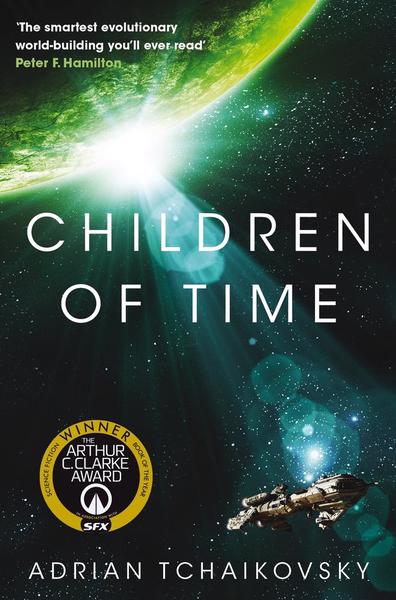Children of time
If there had been some tiny bead present in the brain of all humans, that had told each other, They are like you; that had drawn some thin silk thread of empathy, person to person, in a planet-wide net—what might then have happened? Would there have been the same wars, massacres, persecutions and crusades?

I have a serious phobia when it comes to spiders. I’m not sure if this is some biological thing that most humans have or if it’s because I remember my uncle’s arm when a brown recluse bit him during my childhood.
I’ve learned to overcome my fears to a degree as an adult. For example, I like having the creepy-crawlies in my garden. They’re a beneficial part of the ecosystem, catching pests for me naturally. Whenever I see one while picking veggies, I say, “Hello, Mr. Spider. You just stay out of my way and we won’t have a problem.”
When I decided to pick up a sci-fi book where spiders played a main theme, I was pretty sure I’d be waking up from some arachnid-induced fright in the middle of the night, imagining the things crawling all over me. But, no spider nightmares were had.
The crazy thing is I found myself rooting for the civilization of spiders in Adrian Tchaikovsky’s Children of Time.
I almost put the book down early on because I found the humans totally unlikable. The novel opens with Dr. Kern, a scientist who is the epitome of arrogant. My only hope was that I wouldn’t have to listen to her drivel throughout the entire 600+ pages. But, I stuck it out because this book won the Arthur C. Clarke Award in 2016. And, I’m glad I did.
The plot focuses on two groups, each getting equal screen time throughout the novel until their inevitable meeting.
The first group is the spiders. They’re the result of Dr. Kern’s experiment on a terraformed world out in space. The experiment was to use a nanovirus to artificially speed up the evolution of a planet of monkeys. The monkeys didn’t make it to the planet. However, other species, particularly the spiders, adapted and evolved rapidly while Kern slumbered in her pod in orbit. This evolution over generations is beautifully handled. Portia is one of the most likable non-human characters I’ve ever had the pleasure of reading about.
The second group is, of course, humans. Long after Dr. Kern’s experiment started, Earth has had to build itself back up from the destruction of Kern’s generation. However, the descendants of Earth have nothing left. In many ways, they’re scavengers, picking up the pieces of their long-dead ancestors and making the same mistakes. Several ships set out for the stars to find one of the terraformed worlds their ancestors created with a hope to continue the species.
What’s so unique about this book is the story flows from millennium to millennium, century to century, and generation to generation. We get to follow low-level arachnids who are simply surviving to the point where they ask questions about the world to the point where they have an advanced civilization. It’s a beautiful and wonderous look at the evolution of a species.
And, if that wasn’t enough, the Children of Time doesn’t pull any punches when it comes to war (there’s some awesome spider-vs-ant battles), religion (Kern’s ship is relaying a message to the planet–is it from God?), and sexism (the spiders are a patriarchal society and male spiders are only given what’s allowed by females).
It took me a long time to become invested in any of the human characters. While most were not as irritating as Kern in the opening scenes, few were likable. Perhaps that was the point–that a species such as spiders was more human than the humans. If readers don’t even root for the last of humanity to survive, we should look deep within ourselves as a species and simply be better.
While most of the story flowed well, there were a few points where I was a little bored. Tchaikovsky is obviously an intelligent author, but some of the language could’ve been dialed back for it to be more approachable to a wider audience. This book is for someone who is invested in reading deeply. The author throws a lot of themes at you and expects you to think. This is hard-hitting sci-fi.
I immensely enjoyed this read. It’s not my usual fare, but it’s good to step outside of my nice-and-cozy fantasy comfort zone once in a while.
⭐⭐⭐⭐/5 stars